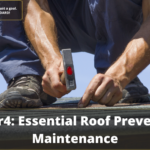In order to become a skilled commercial roofing contractor, one must devote time and energy—not to mention money—into their education. To be a roofer, finding joy in spending hours outside working is a must. Whether you are curious about finding education to become a commercial roofer yourself or simply want more information about the process involved in becoming a professional, this article is for you.
Today, we are going to go into detail about the role of the commercial roofer, what they learn, and why you should consider a professional roofer whenever you need a new roof or repairs.
Job Description: What Roofers Do
Depending on the location and the kind of roof that the individual specializes in, roofing can take on a number of meanings. For instance, there is specialty roofing, residential roofing, and commercial roofing—and roofers exist in every facet.
Since we are focusing on commercial roofing, a roof who works within the commercial industry will have gained the appropriate skills and tools needed to handle commercial-grade materials. Generally, commercial roofing experts spend their time replacing, repairing, and installing roofing systems on business facilities, which can be anything from a warehouse to a school or hospital. Sometimes, they will even work on high-rise structures.
How Are Commercial Roofers Different From Residential Roofers?
The main difference between commercial and residential roofers is the type of roofing they work on. That said, there are many roofing contractors who specialize in both. It is not unusual to find technicians who understand multiple forms of roofing for every kind of building.
Furthermore, commercial roofers generally do not have to worry about slope. More residential buildings have a steeper roof that is designed to shed water, whereas commercial buildings primarily have flat roofing. Because of this, commercial roofs utilize materials specifically designed for flatter surfaces, such as waterproof membranes, like TPO, PVC, or EPDM. The method of installation also changes, and commercial roofs must understand the procedure for every time of commercial roofing available.
How Much Do Professional Roofers Make?
For those who are looking into becoming a roofer themselves, knowing how much you make per year is important. According to the US Bureau of Labor Statistics, the annual average salary of a roofer on the east coast is between $42,300-$45,000. Some states will have lower or higher wages, depending on taxes and economy.
Individual employers also add in benefits, which may include:
- Paid training
- Paid overtime
- Employer-sponsored medical insurance that includes both vision and dental
- Life insurance
- Short term and long term disability
- 401(k) enrollment
- Profit-sharing
- Leadership opportunities
- Paid holidays
What Kind of Education Do You Need to Become a Roofer?
One of the main reasons people choose to forego college and become a tradesperson is the ability to begin working immediately. Most contractors do not require their employees to have experience when they apply since most of your training is going to be done in real-time.
While you do not need an advanced degree to become a professional roofer, it is highly recommended that you seek out professional certification from organizations. Also, some attributes are required. For example, you should not be afraid of heights. Since you will be at least 3 stories up in most cases, you should be able to climb a ladder without issue. Furthermore, you must be physically fit enough to haul equipment, tools, and materials up and down a ladder.
When you begin your apprenticeship as a roofer, you will also gain knowledge in decoding building blueprints, mathematics, and general troubleshooting. Your employer may also request that you gain an understanding of safety skills, too. If you are looking for a leadership position, you may want to invest some time into college courses or project management, but that is not always necessary.
Why You Should Use a Professional Roofer
Now that you know a bit more about what is required to become a professional roofer, you may be wondering if it is worthwhile to have one for your next roofing project. As you found out, roofers are trained from day one to do their job successfully. This means that they may be able to spot issues with your roof that would otherwise go unnoticed.
Qualified roofers also have tools and knowledge meant for dealing with roofing issues. A commercial roofer will understand why your membrane is peeling back or why there is water trapped underneath with just a glance; they will also be able to repair those issues in a more timely manner than someone attempting to do it themselves.
Lastly, if you are considering DIYing your roof, think first about the warranty on the materials. Unless you are a certified roofing contractor, many manufacturers will nullify the warranty on their products. This means that, if you mess up the installation, the warranty will not be honored. If the same defect arises after a professional contractor does the work, you will be able to get a replacement—no questions asked.
It is merely because professional commercial roofing contractors are often certified to install a manufacturer’s products and must adhere to strict standards at all times.
Looking for a Commercial Roofing Contractor?
RGB Construction has been serving the region for decades. After many happy customers, we are proud to say that our team is the best of the best. You never have to worry about roofing problems in the future when you get RGB Construction on the job today. Give us a call or send us a message to learn more about our services.
Check Out Our Other Chapters Of “The Ultimate Guide To Commercial Roofing” Below!
 Chapter 2: Commercial Roof Types: What to Know About Different Systems
Chapter 2: Commercial Roof Types: What to Know About Different Systems
There is more to commercial roofing than black vs white roofing. Materials and systems are extremely varied, and not all of them are going to work for you.
 Chapter 3: All About Commercial Roof Installation
Chapter 3: All About Commercial Roof Installation
Ready to have your new commercial roof installed? Get the facts before the installation team arrives. In this chapter, we outline the process step-by-step, hopefully eliminating any questions or concerns you might have.
 Chapter 4: Essential Roof Preventative Maintenance
Chapter 4: Essential Roof Preventative Maintenance
Preventative maintenance is essential to prolonging the life of any roof. Learn some helpful steps.
 Chapter 5: Is It Time for Replacement or Can Your Commercial Roof be Repaired?
Chapter 5: Is It Time for Replacement or Can Your Commercial Roof be Repaired?
Do you know when it is time to say goodbye to your current roof? We are going to explain some of the tell-tale signs to watch out for. Also, you will learn about different methods of repair, restoration, and replacement available.








